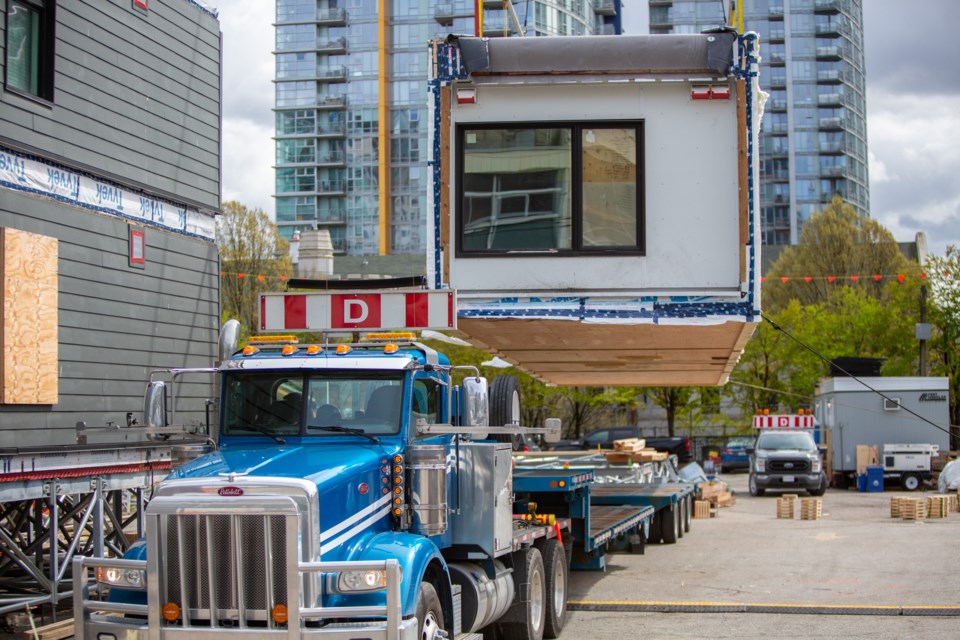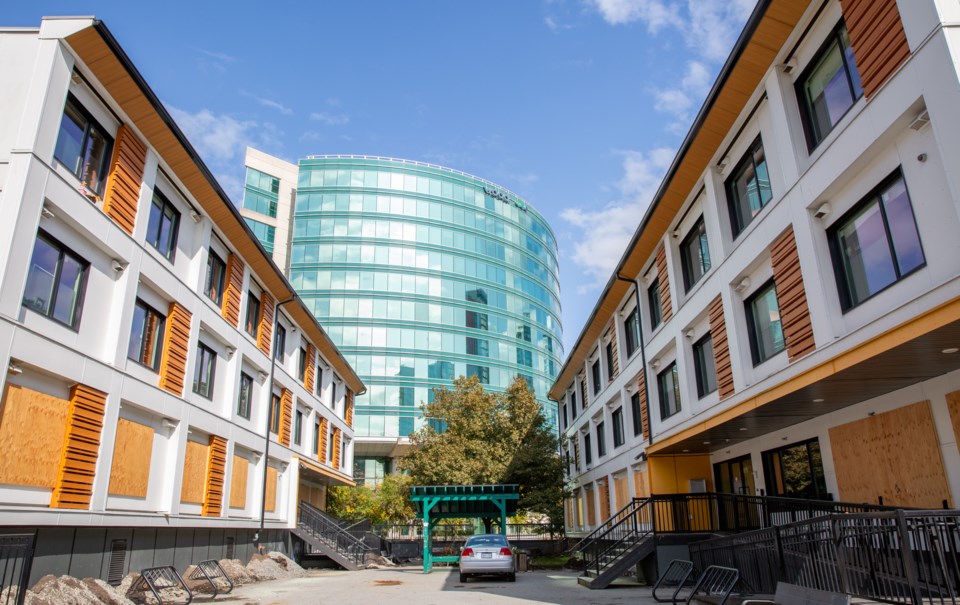The large modular housing complex that was removed this year from the future site of the new Vancouver Art Gallery is destined for Kamloops to replace an aging supportive housing building in that community.
BC Housing confirmed this week that the 98-unit two-building complex that was located at 610 and 620 Cambie St. has been moved to Barriere, sa国际传媒, just north of Kamloops. The housing is being refurbished in preparation for its placement at Mission Flats in Kamloops.
“This process will be complete later this year, and the first temporary modular housing building at Mission Flats will open by spring 2025,” BC Housing said in an email. “The second temporary modular housing building will open by fall 2025.”
The housing agency added that the cost to relocate, refurbish and rebuild the modular structures is still being finalized, with budget information to be made available publicly when details are determined.
The refurbished housing will offer the same number of homes — 98 — to people in Kamloops experiencing or at risk of homelessness. The complex will replace an aging 55-unit supportive housing building.
A homeless count conducted in Kamloops in April 2023 over a 24-hour period recorded 312 people without a home. The report said the number of homeless was a 51 per cent increase over a count in 2021.
When the housing was in Vancouver, it occupied the north section of what has been a longtime City of Vancouver-owned parking lot. It was known as Larwill Place and ceased operations in the summer of 2023, with BC Housing relocating tenants to other housing.
The property is now being prepared for the long-promised new art gallery for the site, which is adjacent to the Queen Elizabeth Theatre. Office towers were also in the original plans for part of the property.

Leases set to expire
Jean Swanson, a former city councillor, had been trying to get answers from government officials since last year on the destination and use for the Larwill Place housing.
Swanson was concerned the housing would end up in storage, as was done after the 46-unit modular housing building (The Beach, or t蓹 cec蓹w) was vacated and moved from the Little Mountain development site.
“It’s good that the folks up there get it,” she said, when told of BC Housing’s plan for the modular homes in Kamloops.
Swanson, however, remains frustrated that leases on temporary modular housing buildings in Vancouver are set to expire in the next few years. Last summer, OneCity Coun. Christine Boyle tried unsuccessfully via a motion to council to extend the leases.
Swanson said the housing has been critical to keeping people off the street.
“There's 3,000 people on the supportive housing wait list, and the provincial target for the number of new social supportive housing units [for Vancouver] over the next five years is 583,” she said.
“It's hard to figure out, but we’ve got 760 or so units [of modular housing] that we'll be losing at the end of five years, unless the city renews the leases or finds new sites.”
Tenants' well-being
BC Housing conducted a survey on the impact of temporary modular housing on residents six months after many of the buildings in Vancouver opened.
The survey found that:
• 80 per cent of residents reported that their overall well-being is better.
• 82 per cent said they have experienced positive interactions with neighbours in the surrounding community.
• Nearly all (94 per cent) of residents remained housed six months after they moved in.
'Undue stress for tenants'
The City of Vancouver’s website lists 11 temporary modular housing sites in the city, totalling 657 units. Glacier Media contacted the city Thursday to get an update on when leases will expire for the housing, but those dates weren’t provided.
“We don’t want to share specific dates, as we aim to maximize length of time for each site pending regulatory approvals,” the city said in an email, adding that lease expiry dates for each of the buildings vary, as they are located on vacant or under-utilized sites pending development.
“Dates that may change may cause undue stress for tenants.”
The number of people in Metro Vancouver identified as homeless during a point-in-time count in March totalled 4,821 — a 32 per cent increase over the last regional count in March 2020 when 3,634 were recorded without a home.
While Vancouver (2,420) and Surrey (1,060) had the most homeless, nine other cities in the region all saw increases in homelessness, including the Tri-Cities, where numbers almost doubled from 86 in 2020 to 160 in 2023.
